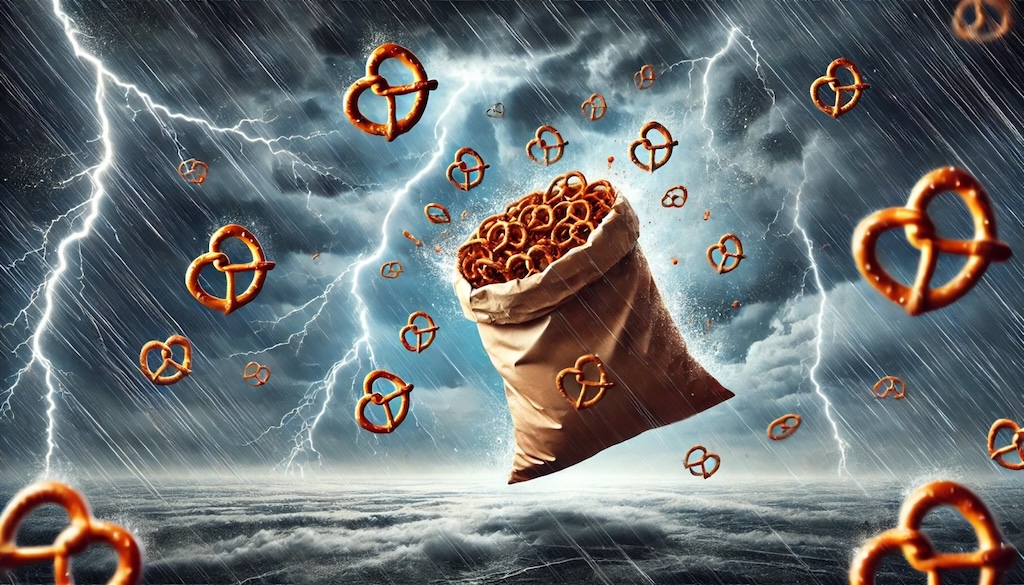
Life Without Good Metaphors Would Be Like a Bag of Pretzels—Completely Useless in a Thunderstorm
Metaphors are the seasoning of language, the salt on the pretzel, the lightning in the thunderstorm. Without them, communication would be dull, lifeless, and as uninspired as a plain, unsalted cracker. But what if we lived in a world without good metaphors? What if our attempts to describe emotions, experiences, or even the simplest concepts fell flat, failing to engage the mind or stir the soul?
It would be a world where words exist, but they don’t connect. And that, my friends, would be like a bag of pretzels—completely useless in a thunderstorm.
The Power of Metaphor: More Than Just Fancy Words
A metaphor is more than just a literary trick; it’s a way of thinking, a bridge between the abstract and the tangible. It allows us to take something complex and make it familiar. When Shakespeare said, "All the world’s a stage," he wasn’t just being poetic—he was giving us a new way to understand human existence.
Imagine a world without such comparisons. Instead of saying, "He’s a ticking time bomb," we’d have to say, "He is experiencing a buildup of negative emotions that may eventually result in an outburst." It’s not wrong, but it’s clunky. It lacks impact. A good metaphor makes meaning immediate.
But in this alternate universe without good metaphors, we'd be stranded with language that fails to carry weight. We’d try to explain things, but they’d come out sounding… well, like a bag of pretzels in a thunderstorm.
Why a Bag of Pretzels?
At first glance, the phrase “a bag of pretzels—completely useless in a thunderstorm” sounds absurd. And that’s exactly the point. Pretzels, delightful as they may be, serve no practical purpose in a crisis. You wouldn’t reach for a bag of them if your power went out. You wouldn’t use them to shield yourself from the rain. You wouldn’t even be able to trade them for shelter—unless, of course, you found a very desperate, very hungry storm chaser.
This phrase highlights how essential good metaphors are. Without them, language loses its ability to guide us through storms—both literal and figurative.
A World Without Good Metaphors: A Communication Catastrophe
Let’s take a moment to imagine a world where metaphors, instead of being useful, were as weak and ineffective as our poor bag of pretzels.
1. Marketing Would Be a Disaster
- Without powerful metaphors, brands would struggle to create slogans that resonate.
- Nike’s “Just Do It” works because it implies action and boldness. If stripped of its metaphorical power, it would become “Perform Tasks Efficiently”—which, frankly, sounds like a bad office memo.
- Apple’s “Think Different” would turn into “Cognitively Process Information in an Uncommon Manner.”
2. Love Letters Would Be Atrocious
- “Your eyes are like the ocean” would become “Your irises resemble the general color and reflectivity of large bodies of saltwater.”
- “You make my heart race” would become “My pulse has increased slightly due to your presence.”
- Romance would be as dry as a pretzel.
3. Teaching Would Be a Nightmare
- Teachers rely on metaphors to make complex topics accessible.
- Instead of “Electricity flows like water through a hose,” physics teachers would have to say “Electricity moves through conductors in a manner dictated by voltage differentials and resistance factors.”
- Goodbye, student engagement. Hello, classroom naps.
4. Sports Commentary Would Be Boring
- Sports thrive on metaphors. A baseball player “knocks it out of the park.” A football team “marches down the field.”
- In our metaphorless world, we’d get: “The batter struck the ball with a force that exceeded the stadium’s containment boundaries.”
- Not exactly thrilling.
Metaphors Give Life Its Color
Without good metaphors, our world would be grey, literal, and uninspiring. Metaphors don’t just make things easier to understand—they make them more interesting. They spark creativity, emotion, and connection.
Consider how often we use metaphor in daily life without even realizing it:
- Time is money (“I can’t afford to waste time”).
- Life is a journey (“I’m at a crossroads”).
- Emotions are weather (“He was clouded by anger”).
These comparisons aren’t just poetic—they shape the way we think. If we lost them, our thoughts would become clunky and mechanical.
How to Keep Metaphors Alive
In an era where communication is increasingly dominated by efficiency (texts, tweets, emojis), we risk losing the richness of metaphorical language. But we can fight back!
Here’s how:
- Read More Literature – Great writers use metaphors masterfully. Dive into Shakespeare, Hemingway, or even modern poets.
- Practice Describing Things Creatively – Instead of saying, “It’s cold outside,” try, “The wind bites like a hungry wolf.”
- Embrace Playfulness in Language – Try making up your own metaphors for everyday experiences.
The more we engage with metaphors, the less likely we are to live in a world where language is dry, stale, and utterly useless—like, well, you know.
Final Thoughts: Bring the Thunder
A world without good metaphors wouldn’t just be boring—it would be confusing, inefficient, and incapable of expressing the depths of human experience.
So the next time you hear a great metaphor, savor it. Let it roll around in your mind like a perfect pretzel, seasoned with just the right amount of salt. And if you ever find yourself in a thunderstorm, don’t rely on pretzels. They won’t help. But a well-placed metaphor just might.